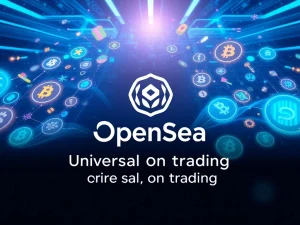SEC Enforcement: Shocking Claims by OpenSea CEO on Unfair Targeting

The approach taken by the Securities and Exchange Commission (SEC) towards cryptocurrency firms has created a significant “regulatory overhang” in the industry, according to Devin Finzer, co-founder and CEO of OpenSea. This piece delves into Finzer’s perspective on SEC enforcement and the evolving landscape for crypto businesses.
OpenSea CEO Speaks Out on SEC Enforcement
Speaking to Crypto News Insights, Devin Finzer expressed his view that the SEC, particularly under prior leadership, unfairly targeted what he termed “good actors” within the crypto space, including OpenSea itself. He criticized the agency’s broad approach, stating, “There’s all sorts of digital assets, you know, you shouldn’t treat them all the same. That’s obvious. But I think the approach that the prior SEC was taking was kind of this, you know, very, very generic.”
Finzer highlighted the formal notification, known as a Wells notice, that OpenSea received in 2024. This notice suggested the NFT marketplace might be operating as an exchange for unregistered securities. At the time, Finzer publicly criticized the SEC’s method of “regulation by enforcement” and indicated OpenSea’s readiness to challenge the action.
Is Crypto Regulation Changing Tides?
Recent developments suggest a potential shift in the stance on crypto regulation in the United States. Under the Trump administration, there has been a noticeable scaling back of enforcement actions against several crypto firms. This contrasts with the more aggressive approach seen in previous years.
Evidence of this policy shift includes the SEC withdrawing legal challenges or dismissing cases against prominent firms such as:
- Coinbase
- Kraken
- Yuga Labs
- OpenSea
- Uniswap
- Ripple (a years-long case dismissal)
Many of these actions were initiated during the term of former Chair Gary Gensler. Finzer expressed hope for a more balanced framework moving forward, one that can protect consumers while also allowing for innovation. He emphasized that the regulatory challenge is not a “one-size-fits-all problem.”
The political landscape has also played a role, with the crypto industry contributing significantly to pro-crypto candidates during the 2024 US election cycle, following then-candidate Donald Trump’s promise to make the US a “crypto capital.”
Challenges and Innovation in the NFT Marketplace
The regulatory pressure and the market downturn following the FTX collapse in late 2022 significantly impacted the NFT marketplace. Trading volume plummeted from its 2021 peak, affecting platforms like OpenSea. In 2023, OpenSea reduced its workforce by 50% due to market conditions.
Despite these challenges, Finzer maintains that the NFT space continues to see innovation, particularly in gaming and art collectibles. OpenSea is also exploring opportunities beyond traditional NFTs, aiming to become a hub for all types of onchain trading.
The Power of Digital Assets
Finzer remains optimistic about the fundamental value proposition of digital assets. He articulated the transformative nature of true digital ownership:
“I mean, for the first time in the history of the internet, people have the ability to own digital stuff, right, in a real way. […] you can move them around between different applications and take them with you wherever you go on the internet. And that’s something that’s really powerful.”
This ability for users to truly own and control their digital items, moving them freely across platforms, represents a significant shift from previous internet models where digital items were often locked within specific applications.
Conclusion: Seeking Clarity Amidst Change
The commentary from the OpenSea CEO highlights the ongoing tension between rapid innovation in the crypto space and the need for clear, balanced regulation. While past SEC enforcement actions created uncertainty, recent policy shifts offer a glimmer of hope for a more tailored approach to governing diverse digital assets and the burgeoning NFT marketplace. The industry continues to advocate for regulatory clarity that fosters growth while ensuring necessary protections.








